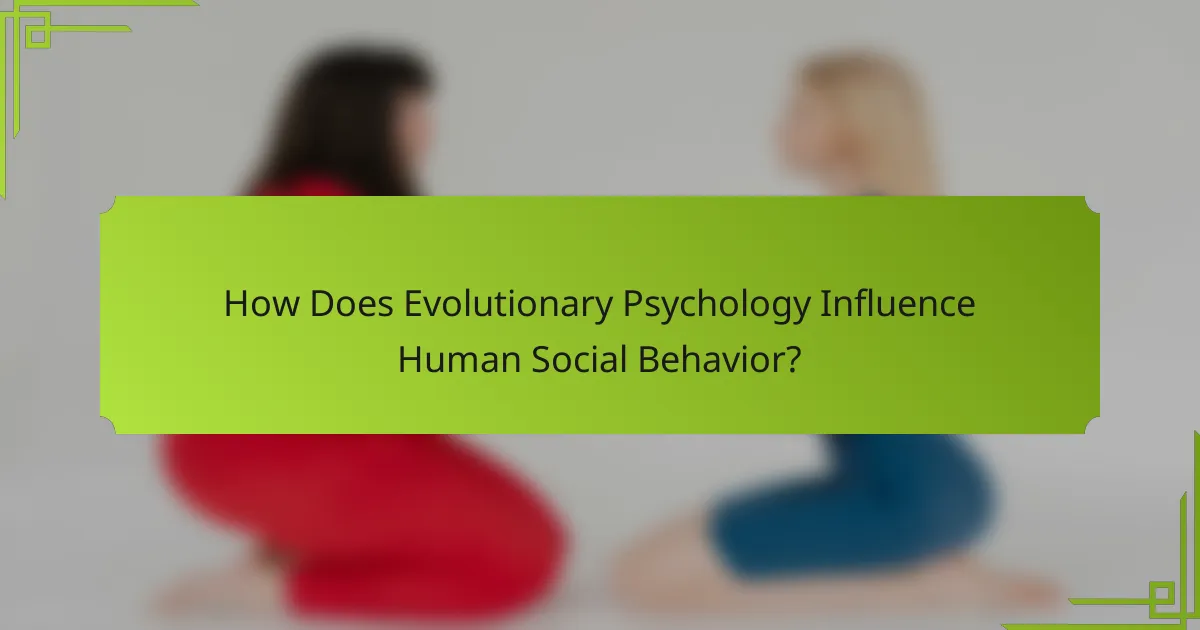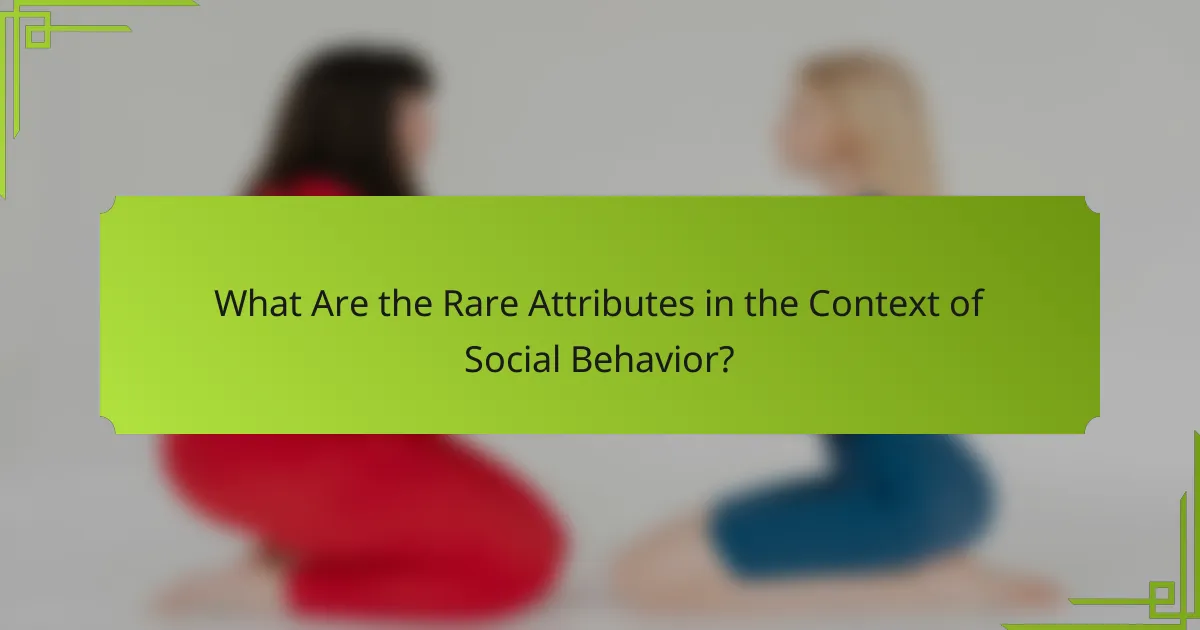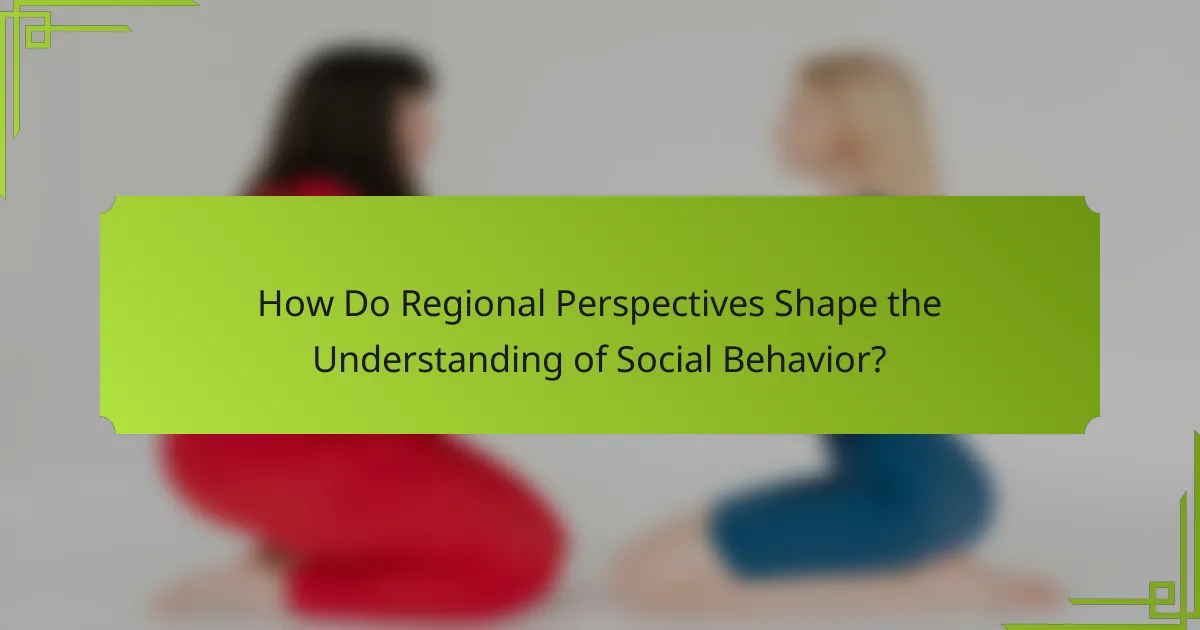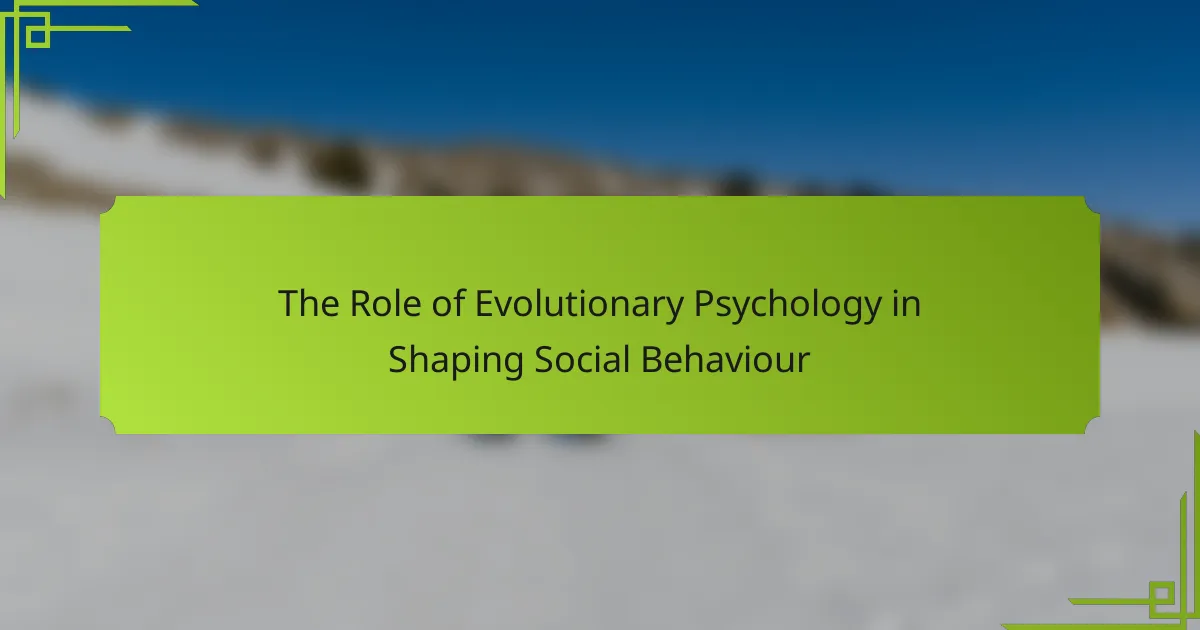Understanding the role of evolutionary psychology can enhance insights into human social behavior. It explains how ancestral adaptations influence cooperation, mate selection, and social hierarchies. The article explores innate behaviors, adaptive traits, and the impact of cultural evolution on social dynamics. Additionally, it examines regional perspectives and practical applications for improving interpersonal relationships and communication.

How Does Evolutionary Psychology Influence Human Social Behavior?
Evolutionary psychology significantly shapes human social behavior by explaining how ancestral adaptations influence modern interactions. It highlights traits such as cooperation, mate selection, and social hierarchies, rooted in survival and reproduction needs. For example, humans exhibit altruism, which fosters group cohesion and enhances survival odds. Unique attributes like empathy and aggression are also explained through evolutionary lenses, showing how they served adaptive purposes. As a result, understanding these influences provides insights into contemporary social dynamics and interpersonal relationships.
What Are the Core Principles of Evolutionary Psychology?
Evolutionary psychology significantly influences social behavior by explaining how human psychology has evolved to address survival and reproductive needs. Core principles include the notion that behaviors are adaptations shaped by natural selection, the emphasis on universal psychological mechanisms, and the understanding that many social behaviors can be traced back to ancestral environments. These principles highlight the connection between evolutionary pressures and contemporary social dynamics, illustrating how innate tendencies manifest in modern interactions.
How Do Evolutionary Theories Explain Social Cooperation?
Evolutionary theories suggest that social cooperation arises from adaptive advantages in group dynamics. Cooperative behaviors enhance survival and reproductive success, fostering stronger social bonds. For instance, kin selection theory explains altruism among relatives, as helping family increases the likelihood of shared genes being passed on. Additionally, reciprocal altruism highlights cooperation among non-relatives, where individuals benefit from mutual exchanges. These frameworks illustrate how evolutionary pressures shape social behavior, promoting cooperation as a fundamental aspect of human interaction.
What Role Does Natural Selection Play in Social Interaction?
Natural selection significantly influences social interaction by shaping behaviors that enhance survival and reproduction. Social behaviors, such as cooperation and altruism, develop through evolutionary processes, promoting group cohesion and increasing individual fitness. For example, individuals who engage in cooperative behaviors often gain social support, which can improve their chances of survival. Furthermore, unique traits like empathy can emerge as adaptations that foster stronger social bonds. Overall, the interplay of natural selection and social behavior illustrates how evolutionary psychology informs our understanding of human interactions.

What Are the Universal Attributes of Evolutionary Psychology?
The universal attributes of evolutionary psychology include innate behaviors, adaptive traits, and social dynamics shaped by natural selection. These attributes guide human interactions, influencing cooperation, competition, and mate selection. Understanding these elements reveals how evolutionary pressures shape contemporary social behavior.
How Does Kin Selection Affect Social Bonds?
Kin selection enhances social bonds by promoting altruistic behaviors toward genetically related individuals. This evolutionary strategy increases the likelihood of shared genes being passed on. Kinship influences cooperation, resource sharing, and support networks, strengthening social cohesion. Research shows that individuals are more likely to assist relatives, enhancing survival and reproductive success within familial groups.
What Is the Impact of Reciprocal Altruism on Group Dynamics?
Reciprocal altruism significantly enhances group dynamics by fostering cooperation and trust among members. This behavior encourages individuals to support one another, leading to stronger social bonds and improved group cohesion. As a result, groups that exhibit reciprocal altruism tend to function more effectively, sharing resources and information that benefit the collective.
Research indicates that groups displaying high levels of reciprocal altruism often achieve greater success in problem-solving and resource management. This is attributed to the increased likelihood of collaboration, as members feel secure in their relationships. Additionally, such dynamics can lead to the emergence of social norms that promote altruistic behavior, further reinforcing group unity.
The unique attribute of reciprocal altruism is its reliance on the expectation of future returns, which distinguishes it from mere selflessness. This expectation creates a cycle of positive reinforcement, where cooperative behavior is rewarded, thereby enhancing overall group performance and resilience.

What Unique Attributes Can Be Identified in Evolutionary Psychology?
Evolutionary psychology uniquely identifies attributes that influence social behavior through innate predispositions. These attributes include adaptive mechanisms, such as mate selection strategies, which enhance reproductive success. Additionally, kin selection highlights altruistic behaviors towards relatives. Cultural evolution reflects how social norms adapt over time, showcasing the interplay between biology and environment. Lastly, the concept of evolved psychological mechanisms illustrates how specific traits, like aggression or empathy, have developed to solve recurrent social problems.
How Do Cultural Evolution and Social Behavior Intersect?
Cultural evolution and social behavior intersect through evolutionary psychology, which explains how human behaviors adapt over time. This discipline highlights the role of inherited traits in shaping social interactions and cultural norms. For instance, cooperation and altruism are seen as advantageous for group survival, influencing cultural practices. Additionally, unique attributes such as emotional expression enhance social bonding, fostering community cohesion. Understanding these intersections allows for deeper insights into contemporary social dynamics and cultural shifts.
What Distinct Social Strategies Emerge from Evolutionary Psychology?
Evolutionary psychology reveals distinct social strategies shaped by innate human behaviors. These strategies include kin selection, where individuals prioritize family members for resource sharing, and reciprocal altruism, which fosters cooperation among non-relatives. Additionally, status competition emerges as a unique trait, driving individuals to seek social dominance and enhance reproductive success. These behaviors stem from evolutionary pressures, promoting survival and social cohesion within groups.

What Are the Rare Attributes in the Context of Social Behavior?
Rare attributes in social behavior influenced by evolutionary psychology include altruism, kin selection, and social grooming. Altruism reflects selfless actions benefiting others, which can enhance group survival. Kin selection prioritizes behaviors that support relatives, ensuring genetic continuity. Social grooming fosters bonds and cooperation, vital for group cohesion. These attributes illustrate nuanced social dynamics shaped by evolutionary pressures.
How Do Anomalous Social Behaviors Challenge Traditional Theories?
Anomalous social behaviors challenge traditional theories by revealing complexities in human interactions. Evolutionary psychology suggests that behaviors often deemed irrational may have adaptive roots. For instance, altruism, despite seeming counterproductive, can enhance group survival. This perspective shifts understanding from rigid frameworks to a more dynamic view of social behavior. Anomalies prompt reevaluation of concepts like kin selection and social exchange, highlighting the need for theories that accommodate variability in human conduct.
What Are Some Unique Case Studies of Evolutionary Psychology in Action?
Evolutionary psychology provides insights into social behavior through unique case studies. One notable example is the study of mate selection, where preferences for traits like symmetry and health signal genetic fitness. Another case involves altruism, which suggests that helping others enhances group survival, demonstrating the evolutionary advantage of cooperation. Research on aggression also highlights how competition for resources shapes social hierarchies, influencing behavior across cultures. These case studies illustrate how evolutionary principles underpin social dynamics, revealing the adaptive nature of human behavior.

How Do Regional Perspectives Shape the Understanding of Social Behavior?
Regional perspectives significantly influence the understanding of social behavior through evolutionary psychology. These perspectives shape how societies adapt behaviors based on environmental factors and cultural norms. For instance, collectivist cultures prioritize group harmony, while individualistic cultures emphasize personal achievement. This variation highlights unique attributes in social behavior, such as communication styles and conflict resolution methods. Additionally, evolutionary psychology suggests that these behaviors have roots in survival strategies, leading to diverse social structures across regions. Understanding these dynamics fosters greater empathy and awareness in global interactions.
What Are the Cultural Variations in Social Behavior Influenced by Evolutionary Psychology?
Cultural variations in social behavior are significantly influenced by evolutionary psychology. Different cultures exhibit unique social norms shaped by historical survival strategies and environmental adaptations.
For example, collectivist societies prioritize group harmony and cooperation, reflecting evolutionary pressures to foster community support. In contrast, individualistic cultures emphasize personal achievement and autonomy, stemming from environments where self-reliance was advantageous.
Additionally, rare attributes such as specific mating strategies and kinship patterns further illustrate how evolutionary factors shape social behaviors across cultures. Understanding these variations enhances insights into human interactions and societal structures.
How Do Local Issues Impact the Application of Evolutionary Psychology?
Local issues significantly influence the application of evolutionary psychology by shaping social behaviors and cultural norms. Regional challenges, such as economic disparity or environmental concerns, drive adaptive responses in communities. These adaptations reflect the unique attributes of local populations, affecting group dynamics and individual interactions. For instance, communities facing resource scarcity may prioritize cooperation and altruism, enhancing social cohesion. This highlights how evolutionary psychology can vary across different contexts, demonstrating its flexibility in addressing specific societal needs. Understanding these local influences provides deeper insights into human behavior and evolutionary adaptations.

What Practical Applications Can Be Derived from Evolutionary Psychology?
Evolutionary psychology provides insights into social behavior by explaining how human evolution shapes interactions. Practical applications include enhancing conflict resolution strategies, improving mental health interventions, and informing marketing techniques. Understanding innate social drives can lead to better communication practices and relationship dynamics. For example, recognizing the role of cooperation in group settings can foster teamwork and collaboration in organizations.
What Best Practices Can Enhance Social Interactions Based on Evolutionary Insights?
Understanding evolutionary psychology can enhance social interactions by emphasizing empathy, cooperation, and communication. These insights reveal that humans are wired for social connections, which can be strengthened through practices like active listening and shared experiences. Additionally, recognizing the importance of nonverbal cues can improve interpersonal relationships. Adopting an inclusive mindset fosters a sense of belonging, which is crucial for positive social dynamics. Lastly, promoting conflict resolution skills can mitigate misunderstandings, aligning with our evolutionary need for group cohesion.
What Common Mistakes Should Be Avoided in Applying Evolutionary Psychology?
To effectively apply evolutionary psychology, avoid oversimplifying complex behaviors, ignoring cultural influences, and assuming universal applicability. Misinterpretation of evolutionary principles can lead to misguided conclusions about social behavior. Acknowledging the interplay between biology and environment is crucial for accurate application.
How Can Understanding Evolutionary Psychology Improve Social Relationships?
Understanding evolutionary psychology can significantly enhance social relationships by providing insights into human behavior and social dynamics. This field reveals how innate instincts and evolutionary pressures shape interactions, fostering empathy and cooperation. Recognizing these patterns allows individuals to navigate social situations more effectively, improving communication and conflict resolution.
For example, understanding the evolutionary basis of trust can lead to stronger bonds and collaboration in personal and professional relationships. By acknowledging shared human experiences, individuals can cultivate deeper connections and foster a supportive environment. Emphasizing these evolutionary traits can lead to healthier and more fulfilling social interactions.
